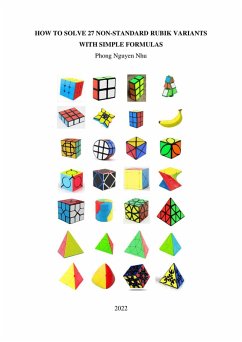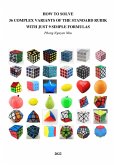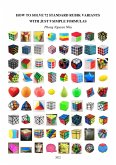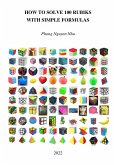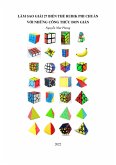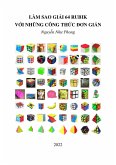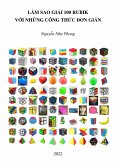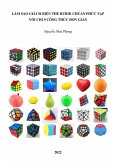The original Rubik, or 3*3*3 Rubik, is a six-sided, six-color cube, cut by six slices, distributed on three axes of Oxyz coordinate system, yielding 27 (3*3*3) Rubik's pieces.
There are many ways to solve the standard Rubik, this book uses the pRubik procedure to solve it. The pRubik procedure consists of 3 steps, using 9 formulas, each consisting of a number of simple rotation steps. Of these 9 formulas, there are 2 pairs with 4 dual formulas, and 2 similar formulas, so actually only 6 independent formulas, therefore it's easy to remember the procedure.
Non-Standard Rubiks are Rubiks whose structures are not the same as that of the Standard Rubik, so the formulas in the pRubik process cannot be used to solve them.
There are many Non-Standard Variants which are variants in size, in shape, in center of rotation, and in transmission when rotating the Rubik's body. Each of these Non-Standard Variants is solved by a procedure. The procedures for solving different Non-Standard Variants are different.
This book will sequentially demonstrate how to solve 27 Non-Standard Variants including: Rubik 1*2*2, Rubik 1*2*3, Pine, Rubik 1*3*3, Spinner, Rubik 2*2*3, Banana, Rubik 2*3*3, Cylinder, Pyraminx 2*2*2, Mastermorphix 2*2*2, Pyraminx, Coin Pyraminx, Petal Pyraminx, Clover Pyraminx, Duomo Pyraminx, Dino, Ivy, Six Spot, Skewb, Fisher Skewb, Twisty Skewb, Redi, Barrel, Butterfly, Gear Cube, Gear Pyraminx.
The author hopes that readers will have an enjoyable time, reading this book to learn and solve the above Rubiks.
Dieser Download kann aus rechtlichen Gründen nur mit Rechnungsadresse in A, B, CY, CZ, D, DK, EW, E, FIN, F, GR, H, IRL, I, LT, L, LR, M, NL, PL, P, R, S, SLO, SK ausgeliefert werden.

